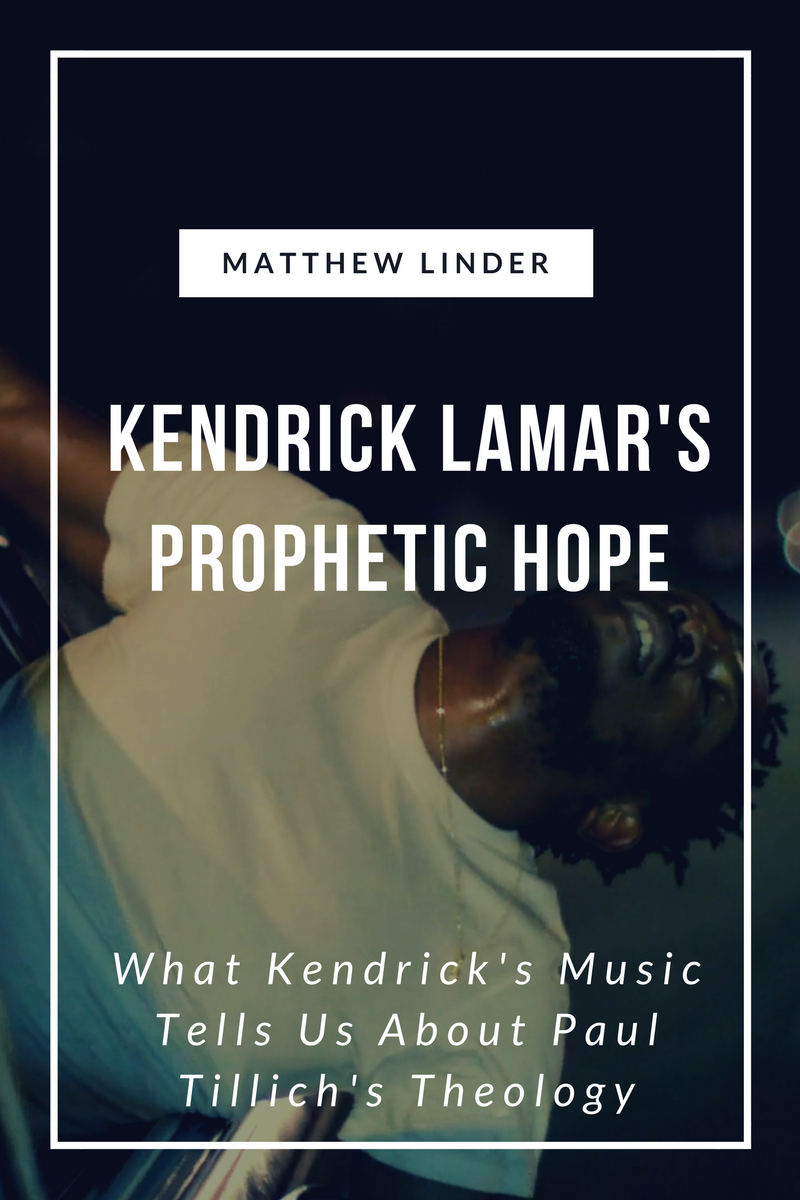Written by guest blogger, Matthew Linder.
@kdotscholar
What Kendrick’s Music Tells Us About Paul Tillich’s Theology…
When I presented a paper, as part of a panel exploring how Paul Tillich’s The Courage to Be can help interpret Kendrick Lamar’s music at the 2016 American Academy of Religion Conference, Dr. Stephen G. Ray, Professor of Systematic Theology at Garrett-Evangelical Theological Seminary, in his response to the panel asked us to consider the inverse, “What can Kendrick’s music tell us about Tillich’s theology?”
Building off the three main themes I explored of Tillich’s theology in relation to Kendrick’s music ([1] self-affirmation, [2] forgiveness of sins, and [3] death/resurrection), I want to attempt to briefly address Dr. Ray’s question.
First, Kendrick defines self-affirmation through a lens which views the dignity of all individual black bodies as divinely-bestowed and uses this framing of self-affirmation as a means of communal bodily resistance to living under a system of white oppression. One thing that Tillich reacts to in The Courage to Be is the hyper-individualism of capitalist societies and the hyper-communalism of communist societies. Tillich rejects both extremes and looks for a better way to be which doesn’t devalue the individual self or the community to which the self belongs. Kendrick’s personal narratives of sin, forgiveness, and redemption (particularly on good kid, m.A.A.d city) is not simply meant to be taken as autobiography but listeners (specifically the black and brown kids in Compton) are encouraged to hear their struggle in Kendrick’s. The “I” in Kendrick’s music operates as an indication of the self but also as the communal “I”, which uses Kendrick’s experience as both the reality of black and brown folks living in a desolated urban space and pointing to a hope grounded in a robust faith in the Christian God. Thus when he sings, “I love myself” on “i” from To Pimp a Butterfly, this phrase is meant as a term of empowerment (counteracting the devaluing of blacks by white oppression) that is further encapsulated within the God-given dignity of his black audience, as Kendrick expresses, that their black selves are “illuminated by the hand of God”.
Secondly, for Kendrick, the acceptance of the forgiveness of his sins is not only a daily and individual practice but a communal one. Tillich views accepting the forgiveness of sins “as the fundamental experience in the encounter with God,” but this is framed as an individual posture towards God not one that is also community-driven. Kendrick’s model of repentance and forgiveness follows the pathways of Old Testament prophets, like Isaiah and Jeremiah, who both sought forgiveness for individual and corporate sins. By allowing individual sins as well as those of his community to burden him, Kendrick can rap in “Alright” (from To Pimp a Butterfly) about the recognition of both within the context of a God that forgives, “Nazareth, I’m fucked up / Homie you fucked up / But if God got us we then gonna be alright,” and provide hope through communal repentance and forgiveness.
Thirdly, Kendrick views the resurrection as a communal hope for the collective good of the community not simply as eternal security for individuals. Tillich states that self-affirmation of the individual arises because one accepts not only eternal security in “the Christian symbol of resurrection” but faces “one’s having to die”. On the Flying Lotus track “Never Catch Me”, Kendrick contemplates his own death but at the same time he has hope inside his bones grounded in the Christian belief in the resurrection.
“In America, it is traditional to destroy the black body — it is heritage” ~ Ta-Nehisi Coates
As Ta-Nehisi Coates writes, “In America, it is traditional to destroy the black body — it is heritage” but Kendrick’s presentation of the resurrection in “Never Catch Me” provides a bodily hope, for now and in the hereafter, where the black body will be eternally restored, never to be destroyed again.
Overall, Kendrick’s music blackens Tillich’s theology, by exploring the existential despair of the reality of individual black bodies in America and seeking to impart a prophetic communal hope — within the story of Christianity — for all black bodies who suffer greatly under a system of white oppression.
Matthew Linder’s article, “‘Am I Worth It?’: The Forgiveness, Death, and Resurrection of Kendrick Lamar,” is now available Ahead of Print! Read it today on TJT Online or on Project MUSE!
Follow Linder on Twitter @kdotscholar!

Comments on this entry are closed.